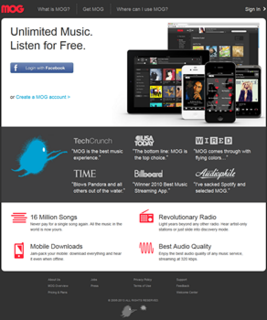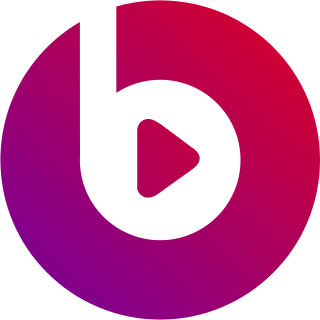History
In 1999, Tim Bratton, J.P. Lester, Sylvain Rebaud, Alexandre Brouaux, Nick Sincaglia and Dave Lampton were working on a new streaming audio engine. This engine was commercially deployed in the TuneTo.com customized radio service, and was also used in their "celestial jukebox" prototype, called Aladdin.
In April 2001, TuneTo.com was acquired by Listen.com, [8] a startup founded in San Francisco by author and entrepreneur Rob Reid, that had built a large online music directory. Aladdin was transformed into the Rhapsody music service during the summer and fall of 2001 and was launched on December 3, 2001. [9]
Rhapsody was the first streaming on-demand music subscription service to offer unlimited access to a large library of digital music for a flat monthly fee, [10] a concept advocated by business theories such as the Open Music Model. At launch, Rhapsody's library was formed of content mostly from Naxos Records and several independent labels. Over the next several months of 2002, they secured licenses from EMI, BMG, Warner Bros. Records, and Sony to add their music to the service. In July 2002, Rhapsody added Universal Records to their catalog, signing the last of the five major record labels of the time.
RealNetworks announced plans to acquire Listen.com on April 21, 2003, one week before the launch of the iTunes Music Store on April 28, 2003. The transaction closed on August 3, 2003. The Rhapsody service was briefly known as RealRhapsody shortly after the acquisition, but was since shortened back to "Rhapsody".
By 2004, some blogs providing sharing of playlists with comments, with names such as "Rhapsody Radish". [11] [12] [13] In late 2007, Music On the Go (MOG) partnered with Rhapsody to allow Rhapsody subscribers to access all of Rhapsody's content through MOG. [14]
In February 2010, Rhapsody's owners announced their intention to restructure the company into a fully independent corporation. Recent problems with the online music subscription service prompted the CEO to make "crucial decisions and think some things through". During this period, dropping the subscription service was considered, but he felt it wasn't the right decision at the time. Instead, the whole Rhapsody team thought of ways to revamp the struggling company and in turn dropped RealNetworks as parent of the company. This was a very risky decision, as the company needed the support, but gained the support of MTV Networks and Viacom, and other independent companies. Since independence, Rhapsody has started the revamping process with a new logo and subscription price changes. [15]
As of January 2011, Rhapsody president Jon Irwin told Reuters the on-demand subscription music service had more than 750,000 subscribers, having added more than 100,000 since becoming an independent company. [16] At that date Rhapsody had a catalog of 11,000,000 songs. [17]
On 3 August 2011, Rhapsody announced that from October 2011 they would no longer re-license DRMed music bought before July 2008. [18]
On October 3, 2011, Rhapsody announced plans to acquire Napster with the deal to be completed by November. [19]
On May 6, 2014, Rhapsody announced its parent company made its first outside investment and led a Series B round for Dubset Media, the operator of streaming music site Thefuture.fm. Terms of the deal were not disclosed.
On April 21, 2016, Rhapsody named its first CEO, Mike Davis. [20] Davis is the first CEO of Rhapsody International, which is the parent company to Rhapsody and Napster.
On July 14, 2016, Rhapsody phased out the Rhapsody brand in favor of Napster and has since branded its service internationally as Napster. [21]
Napster is a set of three music-focused online services. It was founded in 1999 as a pioneering peer-to-peer (P2P) file sharing Internet software that emphasized sharing digital audio files, typically audio songs, encoded in MP3 format. As the software became popular, the company ran into legal difficulties over copyright infringement. It ceased operations and was eventually acquired by Roxio. Napster became an online music store until it was merged with Rhapsody from Best Buy on December 1st, 2011.

Streaming media is multimedia that is constantly received by and presented to an end-user while being delivered by a provider. The verb to stream refers to the process of delivering or obtaining media in this manner. Streaming refers to the delivery method of the medium, rather than the medium itself. Distinguishing delivery method from the media distributed applies specifically to telecommunications networks, as most of the delivery systems are either inherently streaming or inherently non-streaming. There are challenges with streaming content on the Internet. For example, users whose Internet connection lacks sufficient bandwidth may experience stops, lags, or slow buffering of the content. And users lacking compatible hardware or software systems may be unable to stream certain content.

An online music store is a business that sells digital audio files of music recordings over the Internet. Customers gain ownership of a license to use the files, in contrast to a music streaming service, where they listen to recordings without gaining ownership. Customers pay either for each recording or on a subscription basis. Online music stores generally also offer partial streaming previews of songs, with some songs even available for full length listening. They typically show a picture of the album art or of the performer or band for each song. Some online music stores also sell recorded speech files, such as podcasts, and video files of movies.
Last.fm is a music website founded in the United Kingdom in 2002. Using a music recommender system called "Audioscrobbler", Last.fm builds a detailed profile of each user's musical taste by recording details of the tracks the user listens to, either from Internet radio stations, or the user's computer or many portable music devices. This information is transferred ("scrobbled") to Last.fm's database either via the music player or via a plug-in installed into the user's music player. The data are then displayed on the user's profile page and compiled to create reference pages for individual artists.
Napster was an online music store and a Rhapsody company, branded under the purchased name and trademarks of former free file sharing service Napster.
The open music model is an economic and technological framework for the recording industry based on research conducted at the Massachusetts Institute of Technology. It predicts that the playback of prerecorded music will be regarded as a service rather than as individually sold products, and that the only system for the digital distribution of music that will be viable against piracy is a subscription-based system supporting file sharing and free of digital rights management. The research also indicated that US$9 per month for unlimited use would be the market clearing price at that time, but recommended $5 per month as the long-term optimal price.
Yahoo! Music Unlimited was an on-demand online music service launched on May 10, 2005 and provided by Yahoo! Music. The service was discontinued on September 30, 2008.
Urge was an online music distribution service run by MTV Networks. Urge was integrated into Windows Media Player 11.

MOG was a paid subscription online music service and blog network, where subscribers could listen to and read about music. Subscribers could play tracks available in its catalog on a variety of digital devices, including computers, handheld devices, Sonos systems and television. MOG also allowed users to access aggregated editorial content from music blogs, user posts, and in-house editors.

TuneIn is an American audio streaming service delivering live news, radio, sports, music, and podcasts to over 60 million monthly active users. As of 2019, TuneIn has more than 75 million monthly active users.
Deezer is a French online music streaming service. It allows users to listen to music content from record labels, including Universal Music Group, Sony Music and Warner Music Group as well as podcasts on various devices online or offline. Created in Paris, France, Deezer currently has 56 million licensed tracks in its library, with over 30,000 radio channels, 14 million monthly active users, and 7 million paid subscribers as of January 2019. The service is available for Web, Android, iOS, Windows Mobile, BlackBerry OS, Windows, and MacOS.

Spotify is a Swedish audio streaming and media services provider, launched in October 2008. The platform is owned by Spotify AB, a publicly traded company on the New York Stock Exchange since 2018 through its holding company Spotify Technology S.A. based in Luxembourg. Spotify's global headquarters are in Stockholm, Sweden.
Streamwaves was an online music service founded by Jeff Tribble in Dallas TX. Founded during file sharing service Napster's legal troubles, Streamwaves was the first company to license major label masters for a subscription service, and the first company to launch a subscription service with major label content in 2002. In 2005 Streamwaves became part of the Rhapsody Music Service owned by Real Networks.

RealNetworks, Inc. is a provider of Internet streaming media delivery software and services based in Seattle, Washington, United States. The company also provides subscription-based online entertainment services and mobile entertainment and messaging services.
Dalton Caldwell is a technologist and digital music entrepreneur. He is the founder and Chief Executive Officer of Mixed Media Labs. He currently works as a partner at Y Combinator.

Rdio was an online music streaming service that offered ad-supported free streaming and ad-free subscription streaming services in 85 countries. It was available as a website and via app for Android, BlackBerry, iOS, and Windows Phone mobile devices, which could stream music from Rdio's servers or download music for offline playback; there were also clients for the Roku and Sonos systems. The web-based service also offered a native desktop client application for OS X and Windows, as well as a Windows Store application.

rara was a music streaming media service. It operated between December 2011 and March 2015. It offered ad-free, on-demand music streaming from a range of major and independent record labels, including Universal Music Group, Sony Music Entertainment, EMI Music and Warner Music Group, global rights agency Merlin and independent digital distributors The Orchard, INgrooves Fontana, Believe Digital, [PIAS] and VidZone Digital Media.
The following is a list of on-demand music streaming services. The services offer streaming of full-length content via the Internet as a part of their service, without the listener necessarily purchasing a file for download. This type of service is comparable to Internet radio. Many of these sites have advertising and offer non-free options in the style of an online music store. For a list of online music stores that provide a means of purchasing and downloading music as files of some sort, see: Comparison of online music stores. Many of both types of sites offer services similar to an online music database.

Beats Music was a subscription-based online music streaming service owned by the Beats Electronics division of Apple Inc. The service combined algorithm-based personalization with expert music suggestions from a variety of sources.
SoundayMusic is a geosocial networking mobile music streaming app that enables users to listen to and track the music their friends and neighbors are playing in real time. The service provides over 32 million tracks and allows users to create "music stations" choosing between a mix of up to three artists, or choosing a music genre. In the free version users can create up to 10 personalized stations, look at the stations that are being played nearby in real time, and interact with other users through instant chat. The paid, premium subscription removes advertisements and allows users to create an unlimited number of stations. It was launched in 2009 by Soundtracker, and as of December 2014 the service has 1.3 million registered users. Soundtracker is available for iOS App Store, Android Google Play, Windows Phone Store, Windows store, Google Glass, BlackBerry World, Samsung Apps, Amazon Appstore, Nook, and Samsung Smart TV, in 10 languages: English, Spanish, French, German, Portuguese, Italian, Chinese Simplified, Japanese, Korean and Russian. Soundtracker is a registered trademark.









